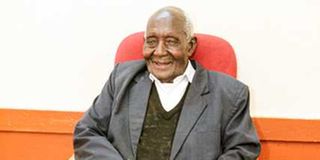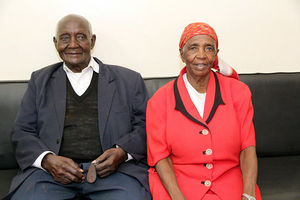
Gerald Gikonyo Kanyuria, a pioneer businessman in Nairobi in the 1930s.
Unless he was introduced to you, city billionaire Gerald Gikonyo Kanyuira would pass as any other rural folk. He was not a man about town.
When I first met him in late 1990s at his Timboroa Hotel in Nairobi - thanks to Mbiri Star's maestro Simon Kihara (Musaimo) - he was taking tea and saucer. We did likewise as we sampled mandazis and hot tea.
Like all pioneer traders, who never mastered the art of sophistication, Kanyuira was a chip off the old block. He had mastered the trade networks in Nairobi's Eastlands – and later built a solid hub down-town River Road and adjacent sites. Kanyuira never lived large – and always slept in his hotels. He had a wiry frame thanks to a life of simple living and hard work.
Very little is written of him and newsrooms have no images of his earlier days. In 2017, then Nairobi Governor Evans Kidero, plucked him from self-imposed silence and honoured Kanyuira with a Key to the City. This cherished tradition symbolised trust, honour and recognition of celebrated individuals for their roles in making cities. It was perhaps one of the first times many heard of him.
In the same year, then President Uhuru Kenyatta at State House, Nairobi, honoured him with a First Class Order of the Elder of Burning Spear (EBS) award. Mr Kenyatta described Kanyuira as part of a generation that "changed Nairobi from being a city of wazungu to a city of Africans." This was the first recognition Kanyuira received from the State as a pioneer African businessman in Nairobi.
Rwathia Group of Companies
As the living symbol of Rwathia Group of Companies- a multi-billion enterprise, Kanyuira stood out. Like most veterans, he loved wearing a coat over a sweater. The coat had seen better days and must have sheltered him from countless storms. Although he owned several buildings, including Magomano Hotel, Alfa House, Timboroa Hotel, Kinangop Hotel and various other properties in Nairobi, Kanyuira was frugal to a fault. He epitomised the value of simplicity, thrift, and contentment.
The best known of Rwathia Group's empire is Nairobi's Sabina Joy, a citadel of vice, sin, and happy hours. As a beer den, Sabina Joy represents Nairobi's drinking culture and as a house of sin, it is the space where gender freedoms are exercised with little inhibition.
Born in 1914, Kanyuira's story is one of how Africans navigated the colonial urban spaces as they offered services to new townies, who had arrived at the growing Nairobi City as support workers of the colonial economy.
Kanyuira ventured into business in the early 1930s as a hawker after hawking licences were introduced to control the emerging freestyle traders. Like many other entrepreneurs, he was selling vegetables in Parklands, which was strictly reserved for the Asian community, and Eastlands, the hub of the black community.
The regulations barred African hawkers from selling their produce to European areas of Westlands, Kileleshwa and Upper Hill, though they could still build networks that penetrated these suburbs. Some Africans used the Hawker license to supplement the low colonial wages, and it helped them build trade networks within the reserves. Kanyuira was a pioneer in these networks, and that is how he honed his trading skills.
Charcoal and wattle barks
In Nairobi, he also diversified into charcoal and wattle barks. This business flourished and created some of the pioneer African businessmen who registered Kenya Fuel and Bark Supplying Company under the leadership of Kiburi Thumbi in the 1940s. It was this group of pioneers that bought Kiburi House—the first African-owned building in Nairobi—that would inspire many Africans to get into urban business.
Kanyuira would start his long walk into the hotel industry in Nairobi's Eastland, but this was abruptly disrupted by the State of Emergency and the Mau Mau uprising. His Rwathia village was the hub of Mau Mau and veteran freedom fighter Gen Kago Mboko – who always carried a military bugle – came from Kanyuira's village. Kanyuira's arrest and the fact that his businesses closed were indicators of how entrepreneurs seeking economic freedom were also disrupted.
After he left detention, Kanyuira went back to business. In 1958, he sought a licence to operate 'Farmers Bar' in Plot No.5, Githiga Village (Fort Hall), meaning he was starting from the village. By this time, Nairobi was still wary of Kikuyu businessmen, and it was not until October 1962 that he was given a licence to operate a malt and non-spirituous liquor business in Plot No 20, Bahati, under Ruiru Restaurant. In 1967, he changed its name to Rwathia Restaurant and Bar, perhaps to celebrate his rural village.
Kenyanisation policy
The October 1962 licence is important since there is an assumption that the Rwathia Group – and the Kangema entrepreneurs - had benefited from the Kenyanisation policy of the Jomo Kenyatta era.
For instance, in the Kenya Gazette of April 1958, names such as Mwangi Kioi and Bros, operating in Makadara, 'Kikonyo' Kanyuira in Plot 11 Bahati, Jerald Gikonyo Kanyuira in Plot 70 Makadara, Muchohi Gikonyo in Plot No 17 Bahati, Mathioya General Stores, Makadara and Mugoiri Provision Stores in New Pumwani are clear indicators of the entrepreneurial spirit that was thriving then in Nairobi's Eastland. Others that came later included Maina Kimere's New Rwathia Night Club.
From records, Kanyuira would set up businesses and sell them. For instance, in 1965, he transferred his non-spirituous off-licence in Plot 11 Hamza Road (Makadara), registered before independence, to another of his village mates, E.N. Waithaka, trading as Iyego Green Happy Stores. The previous year, 1964, he was running the Gikonyo Kanyuira Hotel in Ofafa Maringo and was licensed to sell alcoholic beverages in his bar in Plot 11 in Bahati. He was only allowed to sell malt and non-spirituous liquor – since Africans in Eastlands were now allowed to take spirits.
By this period, African entrepreneurs were emerging and running shops and bars in Eastlands. Even then Nairobi Mayor Charles Rubia, was running Rubia Modern Stores in Ofafa Maringo, and Muchohi Gikonyo's Gikonyo General Stores was operating in Bahati. Muchohi was a pioneer colonial-era councillor who was almost assassinated in April 1950 for supporting the elevation of Nairobi into a city. It was suspected that Fred Kubai, the radical activist and leader of the East African Union Trades, was involved. Kubai was released for lack of evidence.
In 1965, Eastleigh Rwathia Distributors was registered with a nominal capital of Sh100,000. Operating from Eastleigh Section I, it is not clear whether it was associated with the Rwathia entrepreneurs since the registration was held by a Goan, Joseph Pinto. This company operated until 1977 when it was struck off the register. By then, Rwathia Distributors had emerged and was opening depots across the Mt Kenya region.
So organised were these Rwathia pioneers that by 1961, they had purchased a 2000-acre farm in Nyahururu. The location is now known as Rwathia. When he died on Thursday aged over 110, he may not have realised that he played a bigger part than is appreciated in the growth of African businesses. As others fought for political freedom, Kanyuira was one of the Africans who built his own "blue-chip" local companies and invested locally. He impacted many others who followed his record. It is no wonder that Rwathia is now a hub of central Kenya billionaires – and the original home of Equity Bank.
Kanyuira was traditional. Polygamous, with four wives. He was witty and had a frugal spirit.









